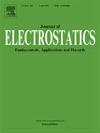Wire-cylinder dielectric barrier discharge for styrene reduction and polymerization into aerosols
IF 1.9
4区 工程技术
Q3 ENGINEERING, ELECTRICAL & ELECTRONIC
引用次数: 0
Abstract
Styrene is a malodorous and toxic gas that poses significant harm to the environment. This paper proposed a dielectric barrier discharge reactor for styrene treatment. The styrene reduction and polymerization were studied. The results showed that the removal efficiency of styrene was 97.9 % at the specific input energy of 25 J/L. The G-value of styrene decomposition was 3.03 molecules per 100 eV. The energy efficiency of plasma-induced styrene removal was 118 g/kWh. The CO2 selectivity was low, and many aerosols were generated. The oxygen-containing groups imply that the electron-induced radical reactions were key to the degradation and transformation of styrene.
用于苯乙烯还原和聚合成气溶胶的线筒介质阻挡放电
苯乙烯是一种有恶臭和有毒的气体,对环境造成重大危害。提出了一种用于苯乙烯处理的介质阻挡放电反应器。研究了苯乙烯的还原和聚合。结果表明,在比输入能量为25 J/L时,苯乙烯的去除率为97.9%。苯乙烯的g值为3.03分子/ 100 eV。等离子体脱除苯乙烯的能量效率为118 g/kWh。CO2选择性较低,产生大量气溶胶。含氧基团表明电子诱导自由基反应是苯乙烯降解转化的关键。
本文章由计算机程序翻译,如有差异,请以英文原文为准。
求助全文
约1分钟内获得全文
求助全文
来源期刊

Journal of Electrostatics
工程技术-工程:电子与电气
CiteScore
4.00
自引率
11.10%
发文量
81
审稿时长
49 days
期刊介绍:
The Journal of Electrostatics is the leading forum for publishing research findings that advance knowledge in the field of electrostatics. We invite submissions in the following areas:
Electrostatic charge separation processes.
Electrostatic manipulation of particles, droplets, and biological cells.
Electrostatically driven or controlled fluid flow.
Electrostatics in the gas phase.
 求助内容:
求助内容: 应助结果提醒方式:
应助结果提醒方式:


